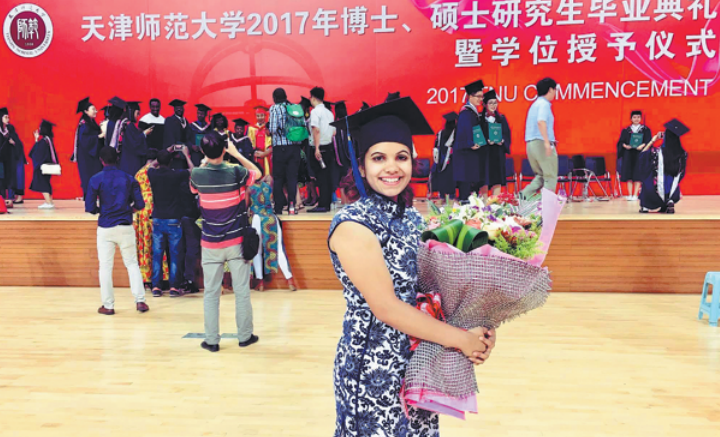Chinese bond turns into family affair
By Wang Xiangyan | China Daily | Updated: 2024-04-09 09:45
Editor's note: China Daily presents the series Friends Afar to tell the stories of people-to-people exchanges between China and other countries. Through the vivid narration of the people in the stories, readers can get a better understanding of a country that is boosting openness.

Shikha Pandey has a one-worded explanation to what brought her and China together — fate.
"I must have been an empress in ancient China and it was fate that brought me and my family here," said Pandey, 32, who is pursuing her PhD in cross-cultural communication at Beijing Language and Culture University.
When the Indian first came to China 11 years ago as part of an exchange program, she was a computer science student. She had no idea she would return to India not as a tech expert but as a Chinese teacher.
And her connections with China turned into a family affair.
"My younger brother is also in Beijing, pursuing his master's degree," she said. "My twin sister is in Taiwan, and my younger sister is in Shanghai. We four siblings are somehow connected to China."
When Pandey decided to go to China for the first time, her father strongly opposed the idea, she said. The opposition eventually gave way to acceptance and pride, with his four children living in China.
Her brother Himanshu said: "My parents were glad that I was enrolled in an MBA program at the University of International Business and Economics in Beijing last year. China is a huge market and I want to do business between China and India after I graduate."
Learning Chinese language opened the door for the family from the Indian city of Mumbai to become familiar with China.
Pandey said she had little interest in computer science during her undergraduate years. She became attracted to Chinese after taking selective courses offered by the Confucius Institute at the University of Mumbai in 2012. An exchange program in Tianjin a year later further encouraged her to study Chinese in China.
"My father had never been outside India and had no idea about China. He believed becoming an engineer was the best choice for me, and he couldn't understand why I would give it up," Pandey said.
Despite her father's apprehensions, she completed her master's degree in teaching Chinese to speakers of other languages with the help of a Chinese government scholarship at Tianjin Normal University in 2017. After that she worked as a Chinese teacher at the University of Mumbai.
The career switch gave her a great deal of satisfaction and joy. Even her father was eventually convinced with Pandey's career decision when he learned more about China and its people.
"I often showed my parents pictures about the life in China. Some of my Chinese friends even visited my parents and invited them to spend Spring Festival together," Pandey said.
Bringing opportunities
"My father gradually realized that Chinese people were very friendly and that studying in China would bring many opportunities. So my parents are very pleased to see my sisters and brother pursue their dreams in China."
Learning Chinese has not only opened up opportunities for Pandey and her family, but also for her students.
"My students learn Chinese for a variety of reasons. Some are interested in Chinese culture and others believe it could lead to a promising career," she said.
One of the students who has impressed her is Syed Sharekh Ahmed, who started to learn Chinese in 2020 while working at Mumbai Airport.
" (Syed) complained to me that the job was very tiring and (he was) often paid late, and I told him that learning Chinese may help him find a way out," Pandey said.
The 35-year-old eventually started working as a Chinese interpreter and technological administrator in a Chinese company, Kingfa Science and Technology, in Pune, in the western Indian state of Maharashtra.
"I like my new job, and the salary has improved a lot, well above the average level," he said.
"Last year, I had an opportunity to visit Guangzhou for the first time and was amazed by China's advanced and modern infrastructure. I am eager to explore more cities in China."
Pandey has been encouraging her students to pursue further studies in China.
Saniya Karnik, 21, is among those who came to Beijing Language and Culture University last year with Pandey's help.
"Because Pandey is pursuing her PhD there, she recommended the university to us and offered assistance in applying for a scholarship," said Karnik, who has been enrolled in preparatory courses for a master's degree in translation studies.
She said the experience in China will bring her more opportunities to work in international companies after her graduation.
When asked about her decision to return to China to pursue her doctoral degree, Pandey said she was keen to witness the country's growth.
"China has developed rapidly over the years, and one important change I have observed is the increased emphasis on cross-cultural communication," she said.
"China and India are culturally bound. The influence of Buddhism can be seen in the whole of China, and many classical works have been well preserved here."
Pandey is working with her students to translate the Buddhist literature The Jataka Tales into Chinese, which can be used as reading material for those learning Chinese.
Zhou Mengxue in Beijing contributed to this story.
























